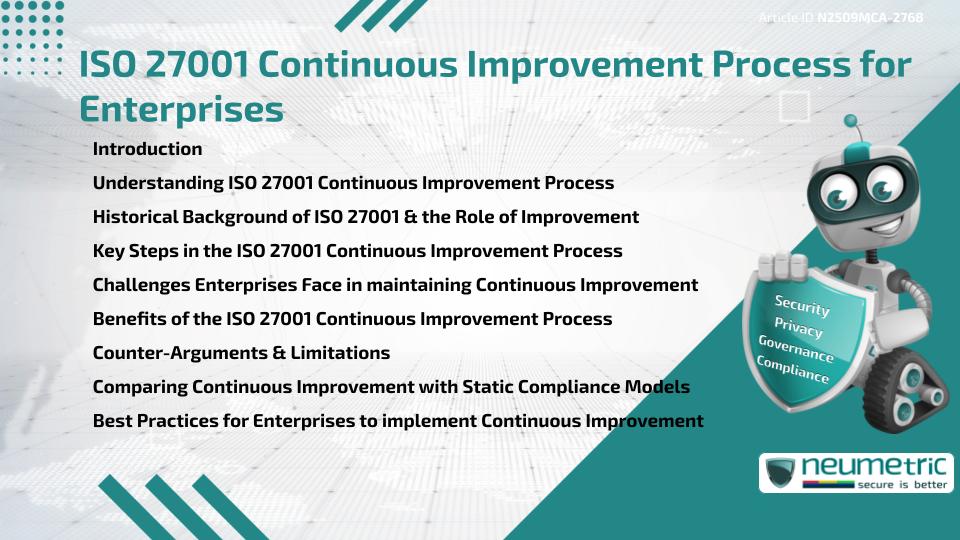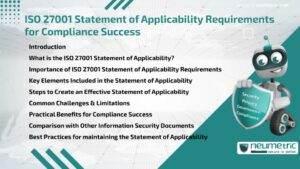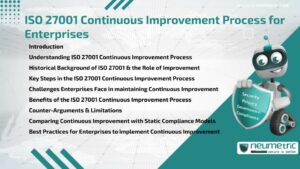Table of Contents
ToggleIntroduction
The ISO 27001 Continuous Improvement Process is a fundamental requirement for enterprises seeking to strengthen their Information Security management system [ISMS]. Rather than treating compliance as a one-time achievement, this process emphasizes ongoing refinement of Policies, controls & practices. By embedding the ISO 27001 Continuous Improvement Process into daily operations, enterprises can adapt to evolving Threats, meet regulatory demands & maintain trust with Stakeholders.
Understanding ISO 27001 Continuous Improvement Process
The ISO 27001 Continuous Improvement Process requires Organisations to regularly assess & enhance their ISMS. It is built on the principle that security environments & Risks are never static. Continuous Improvement ensures that Security Controls evolve alongside Business Operations, technological advancements & regulatory changes.
Historical Background of ISO 27001 & the Role of Improvement
ISO 27001 was first published in 2005 & has since become the globally recognized Standard for Information Security. From the outset, it incorporated Continuous Improvement as a core element, following the Plan-Do-Check-Act [PDCA] cycle. Later revisions in 2013 & 2022 reinforced this concept, making it clear that improvement is not optional but central to maintaining certification.
Key Steps in the ISO 27001 Continuous Improvement Process
Enterprises can follow several steps to implement the ISO 27001 Continuous Improvement Process effectively:
- Plan: Establish objectives, identify Risks & design Security Controls.
- Do: Implement Policies, procedures & safeguards.
- Check: Monitor & evaluate performance using audits, Risk Assessments & key performance indicators [KPIs].
- Act: Apply corrective & preventive actions, refine controls & improve efficiency.
- Review: Conduct management reviews to assess progress & align goals with business strategy.
Challenges Enterprises Face in maintaining Continuous Improvement
Maintaining the ISO 27001 Continuous Improvement Process is not without obstacles. Enterprises often struggle with:
- Resource constraints for ongoing audits & reviews.
- Employee fatigue due to frequent updates & changes.
- Difficulty measuring improvements in intangible areas, such as culture.
- Integration challenges across global teams & systems.
- Maintaining management commitment beyond the Certification stage.
Benefits of the ISO 27001 Continuous Improvement Process
Despite these challenges, the ISO 27001 Continuous Improvement Process delivers considerable benefits:
- Ensures ongoing compliance with ISO 27001 & regulatory requirements.
- Reduces Risks by adapting controls to evolving Threats.
- Strengthens trust with Customers & partners.
- Improves efficiency by eliminating redundant or outdated controls.
- Creates a culture of accountability & proactive security.
Counter-Arguments & Limitations
Critics argue that the Continuous Improvement requirement can become resource-intensive & bureaucratic, especially for smaller enterprises. Others suggest that it may create unnecessary changes that disrupt operations. While these concerns are valid, Continuous Improvement is designed to be scalable, ensuring that even small, incremental changes contribute to long-term resilience.
Comparing Continuous Improvement with Static Compliance Models
Static compliance models often treat Certification as a milestone, focusing on one-time audits. In contrast, the ISO 27001 Continuous Improvement Process treats compliance as an ongoing journey. This distinction makes ISO 27001 a more dynamic & future-proof standard, aligning Information Security with modern Risk Management practices.
Best Practices for Enterprises to implement Continuous Improvement
Enterprises can maximize the effectiveness of the ISO 27001 Continuous Improvement Process by:
- Embedding the PDCA cycle into Business Operations.
- Setting measurable objectives with clear KPIs.
- Conducting regular internal audits & management reviews.
- Leveraging automation tools for monitoring & reporting.
- Encouraging a security-aware culture through training & communication.
Conclusion
The ISO 27001 Continuous Improvement Process ensures that enterprises go beyond one-time compliance & build a resilient, adaptable ISMS. By adopting Best Practices, businesses can protect data, reduce Risks & foster long-term trust with Stakeholders.
Takeaways
- The ISO 27001 Continuous Improvement Process is built on the PDCA cycle.
- It requires ongoing refinement of Security Controls, audits & reviews.
- Challenges include costs, fatigue & integration issues.
- Benefits include Risk reduction, efficiency & sustained compliance.
FAQ
What is the ISO 27001 Continuous Improvement Process?
It is the ongoing process of refining & enhancing an ISMS to maintain compliance & improve security effectiveness.
Why is Continuous Improvement important in ISO 27001?
Because Risks, Threats & business environments evolve, requiring security systems to adapt continuously.
What are the key steps in the process?
The steps include planning, implementation, monitoring, Corrective Action & management review.
What challenges do enterprises face?
Challenges include resource limitations, cultural resistance & difficulty measuring intangible improvements.
How does Continuous Improvement differ from static compliance?
Static compliance focuses on one-time certification, while Continuous Improvement ensures ongoing adaptation & resilience.
Can small enterprises apply the ISO 27001 Continuous Improvement Process?
Yes, the process is scalable & can be adapted to fit smaller Organisations’ resources & needs.
References
- ISO – Information Security Standards
- NIST – Cybersecurity Framework
- Council of Europe – Data Protection and Privacy
Need help for Security, Privacy, Governance & VAPT?
Neumetric provides organisations the necessary help to achieve their Cybersecurity, Compliance, Governance, Privacy, Certifications & Pentesting needs.
Organisations & Businesses, specifically those which provide SaaS & AI Solutions in the Fintech, BFSI & other regulated sectors, usually need a Cybersecurity Partner for meeting & maintaining the ongoing Security & Privacy needs & requirements of their Enterprise Clients & Privacy conscious Customers.
SOC 2, ISO 27001, ISO 42001, NIST, HIPAA, HECVAT, EU GDPR are some of the Frameworks that are served by Fusion – a SaaS, multimodular, multitenant, centralised, automated, Cybersecurity & Compliance Management system.
Neumetric also provides Expert Services for technical security which covers VAPT for Web Applications, APIs, iOS & Android Mobile Apps, Security Testing for AWS & other Cloud Environments & Cloud Infrastructure & other similar scopes.
Reach out to us by Email or filling out the Contact Form…





